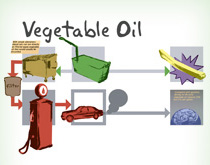
Profound ideas seem to be everywhere at Carnegie Mellon's 13th annual Meeting of the Minds, a competition of undergraduate research. Students, professors, alumni, and guests mull around the University Center, checking out more than 400 entries with some esoteric titles, including this sampling:
- Gesture Recognition Platform for Deaf Users
- Wireless Power Transfer via Magnetic Resonant Coupling
- Impact of Flanged Diffuser on Turbine Performance
- The Effects of Chemical Mechanical Polishing on Integrated Circuit Performance
- Carbon Footprint Modeling of Biofuels
The biofuels idea came from Asa Watten, a senior political science major. When entering his project in the competition, he stated:
Many of us understand that burning petroleum to get around may not be a good thing. At the same time, there is a growing appreciation that the most available alternatives, biofuels, may not be a silver bullet either.
His four posters hanging on the wall capture the attention of a passing student who has a question for Watten.
"Are biofuels the solution to our energy crisis?" he asks.
"You have to consider the life cycle," answers Watten as he proudly points to his posters. They illustrate the life cycles of fuels derived from petroleum, biodiesel, ethanol, and vegetable oil. The life cycles are mapped from oil exploration or land conversion to refining and combustion. Watten also tallied the life cycle of carbon dioxide emissions per gallon of gasoline equivalent for each fuel.
By using the posters, an animated Watten details how biofuels—which are created from renewable sources such as plant matter and waste vegetable oil—have different impacts on the environment. Some good, some not so good—depending on feedstock and production method. He also notes that in Pittsburgh he discovered the ground is fertile to pursue biofuel sources, and that right now the biodiesel being produced locally is reducing waste, greenhouse gas, and other emissions in comparison to diesel.
The student nods in agreement, even though the answer was far more detailed and complex than a simple yes or no.
Such thoroughness and informative posters earn Watten (HS'08) first place in the symposium's Ford Motor Company Undergraduate Research Awards category. And they help him land a job after graduation as resource coordinator for western Pennsylvania's Steel City Biofuels, a nonprofit organization promoting the sustainable and widespread production and use of biofuels.
—JONATHAN BARNES (HS'93)



